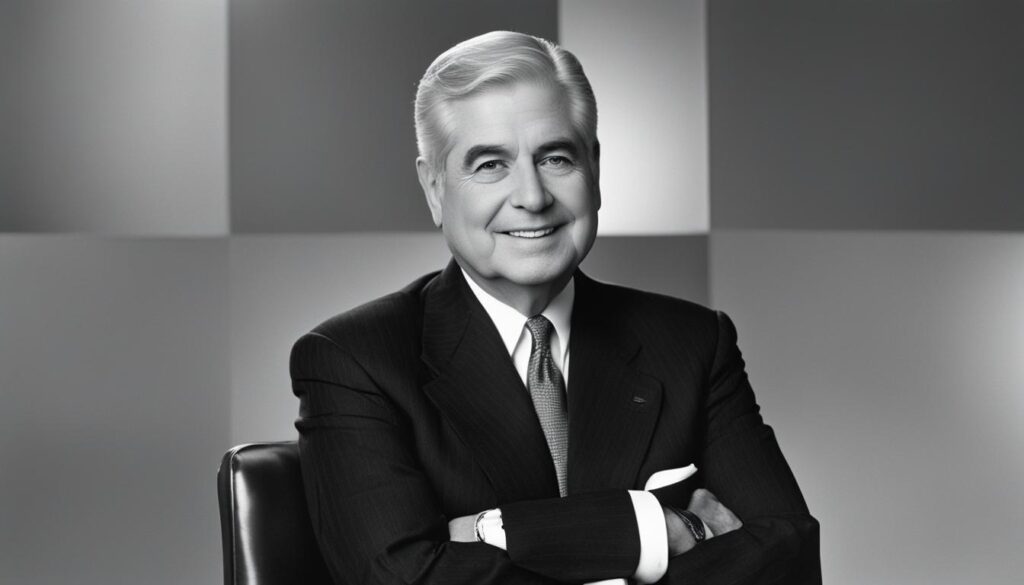Welcome to our article about Lou Gerstner, a prominent figure in the business world, renowned for his exceptional leadership skills. As the former CEO of IBM, Gerstner played a key role in revitalizing the company’s prosperity in the 1990s. His journey is filled with valuable lessons and words of inspiration that can inspire and guide us towards our own goals.
In this article, we will delve into Gerstner’s early life, his career at McKinsey & Company, his executive positions at American Express, and the crisis he faced at IBM. We will explore his strategies for transforming the company and the achievements and successes he accomplished during his tenure. Additionally, we will discuss Gerstner’s contributions to the business world, his book “Who Says Elephants Can’t Dance?”, and the lasting impact he made on IBM’s culture.
Join us as we uncover the remarkable journey of Lou Gerstner and explore the profound leadership wisdom he imparted along the way. Discover how his innovative strategies and ability to navigate challenges can inspire and guide us towards achieving business success.
Key Takeaways:
- Lou Gerstner’s insights and leadership wisdom have made him a respected figure in the business world.
- Gerstner’s strategic approach to leadership and his ability to drive organizational change were instrumental in IBM’s turnaround.
- His book “Who Says Elephants Can’t Dance?” offers valuable lessons on leadership, management, and corporate culture.
- Gerstner’s emphasis on adaptability, customer focus, and fostering innovation can guide us in achieving business success.
- His influence on IBM’s culture transformed the company into a more agile and customer-centric organization.
The Early Life and Education of Lou Gerstner
Lou Gerstner, the renowned American businessman, was born and raised in Mineola, New York. His early life laid the foundation for his remarkable journey in the business world.
Gerstner’s educational endeavors began at Chaminade High School, where he honed his skills and developed a passion for learning. Fueled by ambition and a drive for success, he pursued higher education at esteemed institutions.
In 1963, Gerstner graduated with a bachelor’s degree in engineering from Dartmouth College, equipping him with a solid understanding of the technical aspects of business. This educational background would prove invaluable as he navigated complex corporate landscapes.
Continuing his pursuit of knowledge, Gerstner sought to broaden his horizons and deepen his understanding of business management. In 1965, he earned an MBA from Harvard Business School, solidifying his expertise in organizational dynamics and strategic decision-making.
Gerstner’s education not only equipped him with the knowledge required for success but also shaped his leadership philosophy. He embraced the importance of a multidisciplinary approach and the integration of practical business insights with technical acumen.
“Education is the passport to the future, for tomorrow belongs to those who prepare for it today.” -Lou Gerstner
| Education | Institution | Year |
|---|---|---|
| Bachelor’s Degree | Dartmouth College | 1963 |
| MBA | Harvard Business School | 1965 |
Career at McKinsey & Company
After completing my studies, I embarked on an exciting journey at McKinsey & Company, one of the world’s most renowned consulting firms.
At McKinsey, I had the privilege of working alongside brilliant minds and experienced professionals who pushed me to expand my horizons. I joined as a fresh graduate, eager to make an impact in the corporate world.
My role at McKinsey initially revolved around corporate strategy, where I honed my skills in problem-solving, critical thinking, and decision-making. Working on various engagements and projects, I was exposed to diverse industries, helping organizations tackle their most pressing challenges.
“The McKinsey experience taught me that success hinges on the ability to transform complex problems into innovative and practical solutions. It taught me the importance of analytical rigor, collaboration, and a holistic approach to decision-making.”
McKinsey provided me with a strong foundation in business strategy and a deep understanding of the corporate landscape. The exposure to different industries and the opportunity to work with top-tier clients broadened my perspective and sharpened my problem-solving skills.
This invaluable experience at McKinsey laid the groundwork for my future endeavors and propelled me towards my passion for driving transformative change in the business world.

Stay tuned for Section 4, where I share my journey at American Express and the significant executive positions I held within the organization.
Executive Positions at American Express
In 1978, Lou Gerstner made a significant career move by joining American Express, a renowned financial services company. During his tenure, Gerstner held various executive positions within the organization and played a pivotal role in driving its growth and profitability.
“My time at American Express allowed me to gain invaluable experience in the financial services industry and make meaningful contributions to the company’s success.”
Gerstner’s expertise and strategic leadership made a lasting impact on American Express. Through his executive positions, he helped shape the company’s direction, fostering innovation, and enhancing customer experiences.
One of Gerstner’s key accomplishments at American Express was spearheading the expansion of the company’s financial services portfolio. Under his guidance, American Express launched new products and services, strengthening its position in the market.
During his time at American Express, Gerstner also emphasized the importance of customer-centricity. He prioritized initiatives to improve customer satisfaction, developing innovative solutions tailored to customers’ needs and preferences.
Executive Positions at American Express
| Position | Description |
|---|---|
| Chief Financial Officer (CFO) | Oversaw financial operations and strategies, ensuring optimal financial performance. |
| President of the Travel Related Services Group | Directed the company’s travel-related businesses, driving growth and profitability in the sector. |
| Executive Vice President of American Express Company | Played a crucial role in shaping the company’s overall strategy and guiding key business decisions. |
Lou Gerstner’s executive positions at American Express cemented his reputation as a versatile and accomplished leader within the financial services industry. His contributions to the company’s success continue to inspire leaders seeking to drive growth and innovation in their respective organizations.

Crisis at IBM and Gerstner’s Appointment as CEO
In 1993, IBM found itself in the midst of a severe crisis. The company was facing significant financial losses and grappling with a fragmented organizational structure. Desperate for a turnaround, IBM’s board of directors made a bold decision by appointing Lou Gerstner as the new CEO.
Gerstner’s appointment marked a departure from tradition, as he became the first outsider to lead the iconic technology company. With his extensive experience and proven track record, Gerstner brought fresh perspectives and leadership to IBM, a move aimed at revitalizing the struggling giant.
“It was a crisis of unprecedented proportions, and it required radical action. The board’s decision to bring in an outsider like me was a clear indication of their willingness to embrace change and take decisive steps toward a turnaround.”
The crisis at IBM demanded immediate action and a strategic vision to restore the company’s profitability and competitiveness. Under Gerstner’s stewardship, IBM initiated a comprehensive transformation that would redefine its course and solidify its position in the technology industry.
To navigate the crisis, Gerstner understood the need to address IBM’s structural flaws, streamline operations, and refocus on core business capabilities. This involved consolidating redundant business units, aligning strategies, and investing in areas that would drive long-term growth and innovation.
Gerstner’s crisis management skills and ability to rally IBM’s workforce around a common goal were instrumental in turning the company around. He emphasized the importance of open communication, employee empowerment, and the alignment of individual efforts with the broader organizational objectives.
Under his leadership, IBM underwent an extensive restructuring process, shedding non-core businesses and refocusing on its strengths in technology and services. This strategic refocus, combined with Gerstner’s commitment to innovation and customer-centricity, laid the foundation for IBM’s remarkable turnaround.

Achievements and Successes under Gerstner’s Leadership
Under Lou Gerstner’s visionary leadership, IBM experienced an extraordinary transformation that shaped the company’s path to success. Guided by Gerstner’s strategic direction, IBM not only reclaimed profitability but also became a global leader in the technology industry. Through a relentless pursuit of innovation and a commitment to excellence, Gerstner’s tenure as CEO marked a defining chapter in IBM’s history.
During Gerstner’s tenure, IBM achieved remarkable accomplishments that solidified its position at the forefront of the technology landscape. Here are some key achievements under Gerstner’s leadership:
- Financial Turnaround: Gerstner led a remarkable financial turnaround, steering IBM away from the brink of collapse. He implemented strategic measures to streamline operations, boost efficiency, and restore profitability. As a result, IBM witnessed a significant increase in revenue and emerged as a thriving and financially stable organization.
- Revitalizing Innovation: Gerstner recognized the critical role of innovation in driving IBM’s success. He championed a culture of creativity, encouraging employees to think beyond boundaries and embrace emerging technologies. As a result, IBM regained its reputation as an innovative powerhouse, introducing groundbreaking solutions and pioneering advancements in areas such as artificial intelligence, cloud computing, and quantum computing.
- Global Expansion: Under Gerstner’s guidance, IBM expanded its global footprint, establishing a strong presence in emerging markets and strengthening its position in established ones. By leveraging strategic partnerships and delivering tailored solutions to meet the unique needs of different regions, IBM penetrated new markets and achieved significant growth worldwide.
- Customer-Centric Approach: Gerstner prioritized building strong customer relationships and delivering value-driven solutions. By placing the customer at the center of IBM’s operations, he fostered a deep understanding of client needs and forged long-term partnerships based on trust and collaboration.
- Cultural Transformation: Gerstner recognized the importance of cultural transformation in driving organizational success. He instilled a sense of empowerment, collaboration, and accountability, breaking down silos and fostering a unified IBM culture. This cultural shift enabled employees to work together seamlessly, driving innovation and delivering exceptional customer experiences.
Gerstner’s achievements under his tenure at IBM represent a remarkable turnaround story. Through his strategic leadership, the company regained its position as a market leader, setting new industry standards and inspiring future generations of business leaders.

An Overview of Key Achievements and Successes under Gerstner’s Leadership:
| Achievements | Description |
|---|---|
| Financial Turnaround | Implementing strategic measures to restore profitability and financial stability |
| Revitalizing Innovation | Fostering a culture of creativity and pioneering advancements in technology |
| Global Expansion | Establishing a strong presence in emerging markets and strengthening market position |
| Customer-Centric Approach | Building strong customer relationships and delivering tailored solutions |
| Cultural Transformation | Instilling empowerment, collaboration, and accountability to drive a unified organizational culture |
Gerstner’s Contributions to the Business World
Lou Gerstner has made significant contributions to the business world through his exceptional leadership skills, business acumen, and ability to drive organizational change. He is widely recognized for his successful turnaround of IBM, which serves as a textbook example of rescuing a struggling company.
As the CEO of IBM, Gerstner implemented a series of strategic initiatives that revitalized the company and restored its profitability. His leadership skills were instrumental in navigating the challenges faced by IBM, including financial losses and a fragmented organizational structure. Through his visionary approach, Gerstner transformed IBM into a global leader in the technology industry.
“In the end, strategy is really just resource allocation.” – Lou Gerstner
Gerstner’s leadership was characterized by his ability to make tough decisions, streamline operations, and reduce bureaucracy. He recognized the importance of customer relationships and prioritized customer-centricity in IBM’s business strategy. This customer-focused approach and emphasis on innovation were key factors in IBM’s resurgence under Gerstner’s leadership.
Gerstner’s contributions to the business world extend beyond his tenure at IBM. His expertise and insights have influenced leaders across various industries and continue to inspire professionals seeking to drive organizational change and achieve business success.
Leadership Skills and Organizational Change
One of Gerstner’s most notable contributions is his demonstration of exceptional leadership skills in times of crisis. He effectively led IBM through a period of significant change and guided the company towards a successful turnaround. His ability to motivate and inspire employees, as well as his strategic decision-making, were crucial in transforming IBM’s culture and revitalizing its operations.
Gerstner’s approach to organizational change centered on collaboration, innovation, and a customer-centric mindset. He fostered a culture of agility and adaptability, encouraging employees to embrace change and challenge the status quo. Through these efforts, Gerstner was able to drive lasting organizational change, positioning IBM for long-term success.
“Culture is not just one aspect of the game… It is the game.” – Lou Gerstner
Gerstner’s leadership philosophy also emphasized the importance of developing strong leadership teams. He recognized the value of diverse perspectives and sought to create an inclusive environment that promoted collaboration and innovation. This focus on building effective teams and fostering a positive work culture has had a lasting impact on IBM and serves as a testament to Gerstner’s contributions to the business world.
| Contributions | Leadership Skills | Organizational Change |
|---|---|---|
| Successful turnaround of IBM | Exceptional decision-making | Culture transformation |
| Inspiration for leaders across industries | Motivational leadership | Emphasis on collaboration |
| Driving innovation and change | Strategic vision | Customer-centric mindset |
Lou Gerstner’s contributions to the business world have left a lasting legacy of leadership excellence, organizational transformation, and business success. His ability to navigate challenging situations and drive change continues to inspire leaders across various industries to this day.
Gerstner’s Book: “Who Says Elephants Can’t Dance?”
After successfully leading IBM’s turnaround, Lou Gerstner chronicled his remarkable journey in his book, “Who Says Elephants Can’t Dance?” Published in 2002, this insightful account offers valuable lessons on leadership, management, and corporate culture.
The book serves as a beacon of hope for individuals and organizations facing business challenges, providing inspiration and guidance in navigating through turbulent times. Gerstner’s candid storytelling and practical wisdom make it a compelling read for aspiring leaders and those seeking to drive meaningful change.
“Change is the essential process of all existence.” – Lou Gerstner
In “Who Says Elephants Can’t Dance?”, Gerstner shares his experiences, challenges, and successes as he transformed IBM into a thriving company. Throughout the book, he highlights the key strategies and decisions that shaped the company’s turnaround, making it an invaluable resource for leaders seeking to revitalize their organizations.
Lessons from “Who Says Elephants Can’t Dance?”
- Effective leadership: Gerstner offers insights into leadership principles and approaches that inspired and motivated his team during IBM’s transformation.
- Strategic management: The book delves into Gerstner’s strategic decision-making process and the measures he took to reposition IBM in the technology industry.
- Corporate culture: Gerstner emphasizes the importance of nurturing a strong and adaptive corporate culture, fostering innovation, and embracing change.
| Key Takeaways from “Who Says Elephants Can’t Dance?” |
|---|
| 1. Leadership is crucial in guiding an organization through periods of change. |
| 2. Embracing innovation and adapting to evolving market dynamics are vital for sustained success. |
| 3. Building a customer-centric culture fosters deeper connections and long-term relationships. |
| 4. Effortlessly managing change requires thoughtful planning, clear communication, and engaging stakeholders at all levels. |
Gerstner’s book serves as a testament to the power of leadership, resilience, and the ability to lead transformational change. If you’re seeking inspiration and practical insights for driving organizational success, “Who Says Elephants Can’t Dance?” is a must-read.
Lessons from Gerstner’s Leadership Philosophy
Gerstner’s leadership philosophy encompasses several key principles that have contributed to his remarkable success in driving business turnaround and innovation. His approach emphasizes adaptability, customer focus, agility, and cultural transformation. By embracing these principles, leaders can pave their paths to business success and create a culture of innovation.
Adaptability: Embracing Change
One of the fundamental lessons from Gerstner’s leadership philosophy is the importance of adaptability. He recognized the need for change and embraced it rather than resisting or avoiding it. This openness to change allowed him to steer organizations through challenging times and lead successful transformations.
Customer Focus: Prioritizing Customer Needs
Gerstner’s emphasis on customer focus highlights the significance of understanding and addressing customer needs. By prioritizing the customer experience, leaders can build strong relationships, drive loyalty, and fuel business growth. Gerstner’s customer-centric approach played a pivotal role in IBM’s revitalization and success.
Agility: Navigating a Dynamic Business Landscape
Gerstner’s leadership philosophy acknowledges the necessity of agility in a rapidly changing business landscape. He emphasized the need for organizations to be proactive, flexible, and responsive to market trends and customer demands. By fostering an agile mindset and culture, leaders can position their businesses for sustained success and growth.
Cultural Transformation: Fostering Innovation
Gerstner’s leadership approach included a focus on cultural transformation. He understood that nurturing a culture of innovation was crucial for driving business success. By creating an environment that encourages collaboration, creativity, and risk-taking, leaders can unlock the full potential of their teams and inspire groundbreaking ideas.
“Leadership is about capturing the imagination and enthusiasm of your people and making sure they have a clear sense of purpose and direction.” – Lou Gerstner
Overall, Gerstner’s leadership philosophy offers valuable insights into driving business success and fostering innovation. Embracing change, prioritizing customer needs, cultivating agility, and promoting cultural transformation are key principles that can guide leaders in navigating the complexities of the modern business landscape.
Gerstner’s Impact on IBM’s Culture
When Lou Gerstner became CEO of IBM, he recognized the need for a major cultural transformation within the company. IBM’s culture at the time was plagued by internal conflicts and bureaucratic processes that hindered innovation and customer-centricity. Gerstner understood that in order to turn the company around, he needed to break down these barriers and foster a culture of collaboration, agility, and customer focus.
“Culture isn’t just one aspect of the game, it is the game. In the end, an organization is nothing more than the collective capacity of its people to create value.” – Lou Gerstner
Gerstner’s approach to cultural transformation was instrumental in revitalizing IBM. He encouraged employees at all levels to embrace collaboration and work together as a unified team. This shift in mindset allowed IBM to tap into the diverse talents and ideas of its workforce, ultimately resulting in increased innovation and efficiency.
Another key aspect of Gerstner’s cultural transformation was the emphasis on customer-centricity. He believed that understanding and prioritizing customer needs was essential for success in a rapidly changing business landscape. By placing the customer at the center of IBM’s operations, Gerstner instilled a mindset of continuous improvement and a deep commitment to delivering value to customers.
“Obsess about the customer, not the competitor.” – Lou Gerstner
Gerstner’s impact on IBM’s culture was evident in the company’s ability to adapt and thrive in an ever-evolving industry. The collaborative and customer-focused culture he fostered allowed IBM to become a more agile and innovative organization.
To further illustrate the transformation that took place under Gerstner’s leadership, let’s take a look at the following table:
| Before Gerstner | After Gerstner |
|---|---|
| Internal conflicts | Culture of collaboration |
| Bureaucratic processes | Agility and efficiency |
| Lack of customer focus | Customer-centric approach |
As shown in the table, Gerstner’s impact on IBM’s culture was transformative. The company shifted from a culture mired in conflicts and bureaucracy to one that embraced collaboration, agility, and customer-centricity. This cultural transformation played a pivotal role in IBM’s resurgence and solidified the company’s position as a global leader in the technology industry.
Legacy and Influence of Lou Gerstner
Lou Gerstner’s legacy encompasses his profound impact on IBM’s historic turnaround and his far-reaching influence on business leaders across the globe. His remarkable ability to drive transformation and navigate complex challenges serves as an enduring source of inspiration for leaders grappling with similar business landscapes.
An extraordinary visionary, Gerstner demonstrated unparalleled leadership skills and an unwavering commitment to revitalizing IBM. Through his strategic initiatives and steadfast determination, he engineered a profound transformation that not only reestablished IBM’s position as a global leader but also set new standards for business success.
“Change is the essence of survival in the business world. To remain relevant and thrive, an organization must be willing to embrace transformation and adapt to evolving market dynamics.”
Gerstner’s Business Transformation Methodology:
- Identification of Key Challenges: Gerstner’s astute analysis enabled him to identify the core challenges plaguing IBM, including financial losses, a fragmented organizational structure, and an outdated corporate culture.
- Strategic Focus on Core Business: Rather than breaking up the company, Gerstner recognized the value of IBM’s core business and chose to sharpen the focus on its strengths while strategically diversifying to stay ahead in the technology industry.
- Cutting-edge Innovation: Gerstner fostered a culture of innovation, encouraging IBM employees to push boundaries and redefine industry standards. This emphasis on innovation propelled IBM to the forefront of cutting-edge technology and cemented its reputation for excellence.
- Customer Centricity: Gerstner prioritized customer relationships and instilled a customer-centric mindset throughout the organization. This approach not only strengthened customer loyalty but also ensured that IBM’s products and services were tailored to meet evolving market needs.
- Cultural Transformation: Recognizing the importance of organizational culture, Gerstner championed cultural transformation initiatives that fostered collaboration, agility, and adaptability. By embracing cultural change, IBM became better equipped to navigate an ever-changing business landscape.
Gerstner’s legacy extends beyond IBM. His business philosophies and leadership principles continue to shape the strategies and decision-making processes of leaders in diverse industries. From his invaluable insights on change management to his relentless pursuit of excellence, Gerstner’s influence reverberates throughout the business world.
Gerstner’s Impact on Leadership
Gerstner’s impact on the concept of leadership is immeasurable. Through his transformative leadership style, he demonstrated the significance of decisive action, strategic vision, and versatility in the face of challenges. Gerstner’s ability to navigate complex organizational landscapes and drive change has inspired leaders to reimagine their approach to leadership and embrace the transformative power of visionary thinking.
Gerstner’s Enduring Legacy
The enduring legacy of Lou Gerstner lies in his indomitable spirit, unwavering dedication, and extraordinary achievements. His business transformation at IBM serves as a testament to the immense influence that a determined leader can have on an organization and an entire industry. Gerstner’s legacy continues to inspire leaders, offering invaluable insights into driving successful business transformations and achieving sustainable growth.
Conclusion
Lou Gerstner’s quotations provide invaluable leadership wisdom, inspiring and influencing leaders across diverse industries. His insights into driving change and achieving business success continue to resonate. By embracing the principles and lessons derived from Gerstner’s journey, we can forge our own paths to success.
Gerstner’s belief in effective leadership permeates his inspirational quotes, urging us to lead with authenticity, empathy, and a customer-centric focus. Through his legacy, his wisdom serves as a guiding light in navigating the complexities of the business world.
Gerstner’s transformative leadership at IBM during a time of crisis showcases the power of strategic decision-making, organizational change, and a relentless pursuit of excellence. His quotations remind us of the importance of adaptability, innovation, and fostering a culture of collaboration.
To achieve business success and inspire teams, we must draw from Gerstner’s wealth of wisdom. By embracing his insights on leadership, we can navigate the challenges of today’s rapidly evolving business landscape with confidence and drive.
What Insights and Leadership Wisdom Can We Learn from Lou Gerstner’s Famous Quotes as the Former CEO of IBM?
Lou Gerstner’s famous quotes inspire insightful leadership wisdom. His focus on transformation and customer-centric approach in business signifies the importance of adaptability and innovation. His belief in putting customers first and driving change within the organization reflects the timeless principles of effective leadership. Famous quotes by Lou Gerstner continue to resonate in the business world.
FAQ
What is the significance of Lou Gerstner’s quotations?
Lou Gerstner’s quotations provide valuable insights into leadership, business success, and driving change. His wisdom continues to inspire and influence leaders in various industries.
How did Lou Gerstner’s upbringing and education shape his career?
Lou Gerstner’s early life and education provided a foundation for his later success. Growing up in Mineola, New York, and obtaining an engineering degree from Dartmouth College and an MBA from Harvard Business School allowed Gerstner to develop a strong analytical and strategic mindset.
What was Lou Gerstner’s role at McKinsey & Company?
At McKinsey & Company, Lou Gerstner focused on corporate strategy, gaining valuable experience in problem-solving and decision-making. His work at the prominent consulting firm helped shape his understanding of business dynamics.
How did Lou Gerstner contribute to American Express?
Lou Gerstner held various executive positions at American Express, making significant contributions to the company’s growth and profitability. His expertise in financial services and strategic leadership played a vital role in driving American Express forward.
What led to Lou Gerstner becoming the CEO of IBM?
IBM was facing a severe crisis in the 1990s, with financial losses and a fragmented organizational structure. Lou Gerstner was appointed as CEO, becoming the first outsider to lead the company. His appointment aimed to bring in fresh leadership and drive a turnaround.
What was Lou Gerstner’s strategy for transforming IBM?
Instead of breaking up the company, Lou Gerstner focused on revitalizing IBM’s core business and reestablishing its competitiveness. He implemented significant changes such as streamlining operations, reducing bureaucracy, and strengthening customer relationships.
What were some of the achievements under Lou Gerstner’s leadership at IBM?
Under Lou Gerstner’s leadership, IBM underwent a remarkable transformation. The company regained profitability, experienced innovation, and emerged as a global leader in the technology industry.
What are Lou Gerstner’s contributions to the business world?
Lou Gerstner is recognized for his exceptional leadership skills, business acumen, and ability to drive organizational change. His successful turnaround of IBM is regarded as a textbook example of rescuing a struggling company.
What is Lou Gerstner’s book “Who Says Elephants Can’t Dance?” about?
“Who Says Elephants Can’t Dance?” is Lou Gerstner’s book that provides an insightful account of his experience leading IBM’s turnaround. It offers valuable lessons on leadership, management, and corporate culture.
What can we learn from Lou Gerstner’s leadership philosophy?
Lou Gerstner’s leadership philosophy emphasizes adaptability, customer focus, agility, and cultural transformation. Embracing change, prioritizing customer needs, and fostering innovation are key principles for driving business success.
How did Lou Gerstner impact IBM’s culture?
Lou Gerstner recognized the need to change IBM’s culture, which was previously focused on internal conflicts and bureaucratic processes. He encouraged collaboration, innovation, and a customer-centric approach, transforming IBM into a more agile and customer-focused organization.
What is Lou Gerstner’s legacy and influence?
Lou Gerstner’s legacy includes his significant impact on IBM’s turnaround and his influence on business leaders worldwide. His ability to drive transformation and navigate challenging situations serves as an inspiration for leaders facing similar business landscapes.








